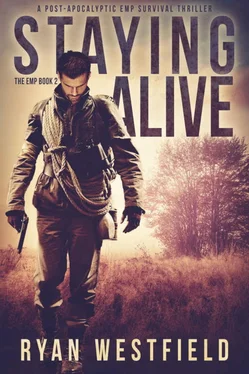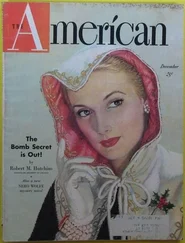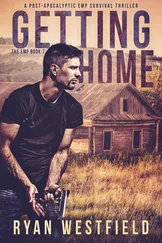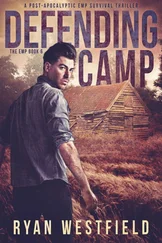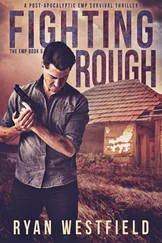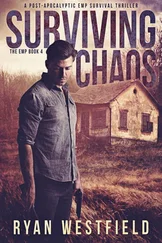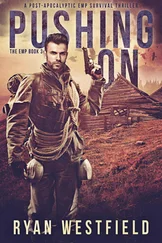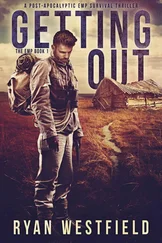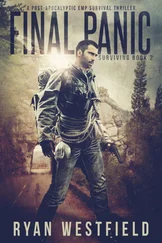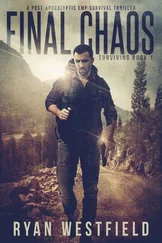He wished he had that gun. But there hadn’t been time to think of things like that. If he’d gone for the gun, there was a good chance he’d have been shot trying to get it, or trying to get out the window.
John gathered up his potatoes and peppers. He was so hungry that his mouth was salivating as he scooped them up. The smell of the peppers was intense and delicious, and John didn’t even like peppers. It was hard for him not to sit down right there and eat everything. That was how hungry he was.
Fortunately, the shed was unlocked.
It was dark inside, and cramped. He couldn’t see much at all at first. Only a little bit of light came in through a couple gaps where the roof hadn’t been fitted correctly to the walls. It wasn’t one of those quality Amish sheds that many in Pennsylvania had. It was just some cheapo knock off, assembled hastily and poorly. But that worked in John’s favor now, since gradually, his eyes adjusted the darkness and soon enough he could see fairly well.
John didn’t waste any time. He ate the potatoes first. They were raw, of course, but he bit into them like apples, eating the skin and everything. His stomach started to ache almost right away, but he ignored it. It was more important to get food into his stomach than worry about whether or not the raw potatoes might make him sick.
Next, he ate the peppers. Normally, he hated spicy food. But the potatoes hadn’t been nearly enough. After all, when was the last time he’d eaten? There’d been that stale bread, but that didn’t have any protein. And then there’d been that bar food. Not much protein there either.
John remembered reading that potatoes actually contained high quality protein. They didn’t show up on the normal nutrition charts as high-protein foods, however, because the protein content was normally measured against the whole weight of the potatoes, including the water. The article John had read had mentioned that during lean times in Ireland, workers were known to survive on nothing but potatoes. Of course, John didn’t know whether he’d be able to effectively assimilate the protein in raw potatoes. Judging by his stomach cramps, there were some problematic components of the potatoes that were normally neutralized by cooking.
Whatever, he couldn’t worry about that now.
The peppers stung his mouth horribly. They were incredibly hot. John didn’t know what type of peppers they were, except that they were an orange-red and incredibly shriveled looking. He was pretty sure that the more shriveled a pepper appeared, the hotter it was on whatever index it was that the experts used to measure spiciness.
For a long while, perhaps hours, John sat with his back against the cheap plywood shed wall. His mouth burned, since there was nothing to wash the peppers down with. His back ached, his shoulder and stomach hurt, and his legs were cramping up, since there was no room to stretch them out.
But at least he was safe for now.
Relatively safe.
Finally, John’s legs couldn’t take it anymore. He had to stretch them.
He was nervous about making any noise that could be heard outside the shed, in case someone was nearby. He had no way to know if someone was inches away from him on the other side of the shed walls. He doubted he’d be able to hear soft footsteps on the grass.
So far, though, he hadn’t heard any noises at all. Nothing but the birds.
John set about rearranging the things in the shed as quietly as he could. It seemed as if no one had been inside it in years. There was a thick layer of dusty grime over most things, and soon John’s fingers and hands were filthy.
There was an old lawnmower in one corner, along with a plastic gas can that made the whole shed smell like gas and made John even more nauseated than he already felt. The half-opened cans of paint and lacquer didn’t help either.
John suddenly realized that having gas inside the shed could be bad. Really bad. Surely people would need gas now, more than ever before. Someone was bound to start entering sheds, looking for gas.
But maybe he’d be lucky. Maybe no one would come.
As John was rearranging things, moving them as slowly and quietly as he could, stacking them on top of one another, he realized he should be looking for things that could be useful to him. He felt dumb for not thinking of it earlier.
There wasn’t bound to be food in the shed, but there had to be something he could use… some sort of weapon, maybe, or some flashlights. If he could find some old camping gear, maybe that would help him.
It took John at least another hour to find what he was looking for. He’d finally arranged all the old rotten wood in one corner. He’d gotten all the rusty gardening tools together and put them above the wood. He’d taken a long hoe that seemed like it was well made and set it aside, thinking he might take it with him. The handle was a strong, dense wood, and the metal head, while a little rusty, seemed like it was well made, of real steel. It was one of those old tools, from back when things were made properly. The edge had been maintained and sharpened over the years, possibly obsessively, until it had been left to sit unused in the shed for who knew how long. It’d probably been used for edging work. John cut his finger as he ran it across the blade.
John could use it as a weapon and a walking stick.
There was also a hatchet, completely covered in rust. It was one of those classic hatchets, the kind they’d sold in hardware stores across the country for decades. They cost about $25 and worked fine, but they weren’t very stain resistant. Taking an edge wasn’t their strong suit, but it would do the job, even with the rust and imperfect edge.
The hatchet could be a good weapon. And if John ever got into the woods, out of the suburbs, maybe he could use it to build a shelter. That was the sort of thing Max would have thought of. And this was the time when thinking like Max, well, it was just the right way to think about things.
John didn’t find the payload for another twenty minutes, moving everything around so slowly and delicately, conscious of the noise, always listening for approaching footsteps or the sound of an engine.
Underneath a dirt-caked tarp, there it was.
An ancient backpack. Looked like army surplus, maybe. It was the kind of pack that hippy kids used to use to hitchhike around the US in the ‘70s.
The pack seemed full. John tried not to get his hopes up. For all he knew, maybe it was just filled with trash, empty liquor bottles or something, a memento of a misspent youth long ago.
He almost couldn’t believe it when he opened up the pack.
Inside, it appeared to be completely full of camping gear.
There was an ancient tent, large and bulky. But it fit inside the pack just fine.
There were two water bottles, full of stale water. Who knew how old the water was.
There was a small emergency medical kit, and a bottle of prescription sleeping pills. Best of all, the rest of the pack was filled with energy bars. They had old labels on them, with graphics that made John think they’d been produced sometime in the mid to late ‘90s.
The contents of the pack were strange. John’s best guess was that about twenty years ago, someone had packed up their old backpack for a camping trip that they never ended up taking. After that, the bag had stayed, still packed, forgotten in the shed.
There wasn’t much else in the pack. It wasn’t complete by any sense of the imagination. But it would be enough.
John immediately went for the water. He smelled it first, and it had a strange odor to it. But he figured it was a risk he’d have to take. He took his first sip and almost spit it out.
But John realized that the majority of the strange taste was most likely coming from the aluminum of the water bottle seeping into the water. He could deal with a little aluminum. It wasn’t like he’d die from that any time soon, if at all. And if there was bacteria in the water? Well, he’d deal with that too. It was better than dying of thirst.
Читать дальше
